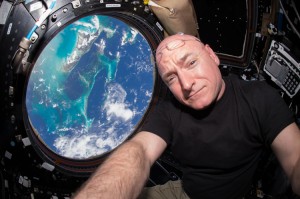Changing Gene Expression in Space
Wednesday, March 28th, 2018March 28, 2018
When astronaut Scott Kelly returned to Earth from a year-long mission aboard the International Space Station (ISS) on March 1, 2016, he was a changed man. Literally. Compared to his identical twin brother, fellow astronaut Mark Kelly, there were several noticeable differences. Scott Kelly had grown about 2 inches (5 centimeters) taller in space, and his overall body mass had decreased a bit. However, National Aeronautics and Space Administration (NASA) scientists were most interested in the changes that could not be seen, changes in Kelly’s genetic makeup. And unlike his physical metamorphosis (his body soon resumed its Earthbound proportions), some changes in Kelly’s DNA seem to be permanent.

U.S. astronaut Scott Kelly poses inside the International Space Station in 2015. Kelly’s body and genetic makeup changed during his weightless year in space.
In 2015, Scott Kelly and Russian cosmonaut Mikhail Kornienko began a unique experiment to learn about the effects of long-term space travel on the human body. The pair spent 340 consecutive days on the ISS as part of a study that will help NASA scientists understand the challenges they must conquer if humans are ever to journey to Mars and beyond. Kelly and Kornienko orbited Earth more than 10,000 times speeding at 17,500 miles per hour (28,165 kilometers per hour) while floating in the weightlessness of microgravity (a condition of very low gravity). During this time, they experienced the stresses and solitude of long-term space flight and were exposed to cosmic radiation above the protective filter of Earth’s atmosphere.

NASA astronaut Scott Kelly (left) and Russian cosmonaut Mikhail Kornienko pose during training at NASA’s Johnson Space Center prior to their year in space. Credit: Bill Stafford, NASA
For experimental control, Scott’s brother Mark remained on Earth. As Scott’s identical twin brother, Mark’s genetic makeup is exactly the same as Scott’s. After Scott returned, NASA scientists studied the twin brothers. Any differences between Scott and Mark could be seen as the effects of the long-term space travel.
The growth spurt that Scott Kelly experienced in orbit turned out to be short-lived and he soon shrank back to his normal height as he returned to Earth’s gravity. But NASA scientists were surprised to find that Scott’s DNA, the genetic material that makes up his genes, was now significantly different from his twin. They found that about 7 percent of Scott’s genes, including those involved in bone formation, DNA repair, oxygen use, the immune system, and eyesight, had altered function when compared to Mark’s genes. Many of these genetic changes appear to be permanent.
NASA scientists think that Scott’s long-term mission in space altered his DNA through processes called epigenetics. Scientists have long known that environmental factors can alter how genes are expressed (how they function) in organisms through epigenetic processes. These processes are not mutations, nor are they physical changes in the DNA. Rather, the processes change how a particular gene functions. Various factors may switch a particular gene on or off or otherwise change how it is expressed. Such environmental factors include nutrition, exposure to certain chemicals, and stress. Scott and Mark remain genetically identical twins, but some of Scott’s genes are now expressed differently compared to Mark’s because of his time in space.



